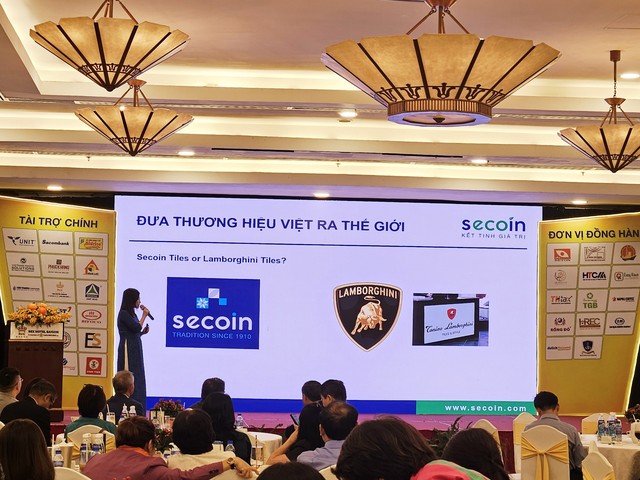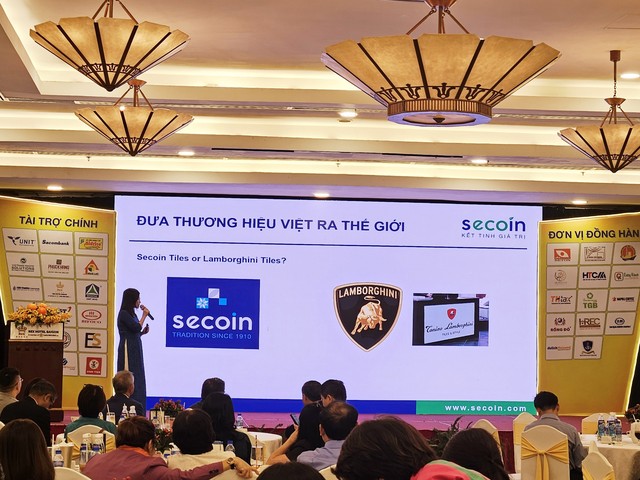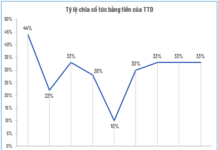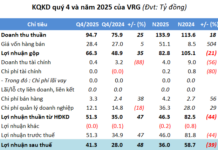At the seminar “Building Vietnamese Brands for Global Development” held as part of the 8th anniversary of the HUBA Entrepreneurs’ Cafe organized by the Ho Chi Minh City Business Association last weekend, Ms. Vo Thi Lien Huong, CEO of Secoin Joint Stock Company, shared a story about how the Italian luxury car manufacturer Lamborghini once approached Secoin with a proposal to produce and export handcrafted tiles under the Lamborghini Title brand to the global market.
“This was a very attractive offer, as handcrafted tiles associated with a prestigious brand would command a higher price. However, we wanted to maintain our Secoin brand as we ventured into the international market. We aim to break free from the perception of Vietnam merely being a manufacturing base for prominent global brands. Secoin creates 100% authentic Vietnamese products and does not engage in contract manufacturing for any other company. We aspire to establish the ‘Made in Vietnam’ label and showcase the country’s true potential,” affirmed Ms. Huong.
Secoin has established itself in the market for 35 years and exports its products to over 60 countries worldwide. The company’s encaustic cement tiles compete with those from Spain, Morocco, Mexico, and Brazil.
Narrating this anecdote, Ms. Huong emphasized her desire to introduce Vietnamese products to the global market, but with the label “Made by Vietnam,” indicating that the products are not just manufactured in Vietnam but are also a creation of Vietnamese ingenuity.

Secoin was approached by the Italian brand Lamborghini for the production of traditional encaustic tiles.
In reality, Vietnam is among the top exporters globally, with a diverse range of products including rice, textiles, leather footwear, wooden furniture, electronics, and technology. However, many Vietnamese export products ultimately reach consumers bearing the brands of foreign companies. Vietnamese enterprises primarily export raw materials or engage in contract manufacturing.

Vietnamese enterprises export their products to numerous countries, but establishing the “Product of Vietnam” label remains a challenging task.
While Vietnamese businesses strive to make their mark in the global market, there have been instances where local brands have been acquired or overtaken by foreign entities. According to these enterprises, the reputation of Vietnamese brands and the trustworthiness of Vietnamese businesses in the international arena remain areas for improvement, despite their products’ superior quality. This is not just a concern for individual companies but also a national issue that calls for a collaborative effort involving government policies and business initiatives to create a positive impact on the world stage.
Ms. Phan Thi Tuyet Mai, CEO of TMTM Company (MORI brand), shared another story about the 2020 Olympic Games in Japan. Among the gifts presented during the event were chocolates produced by her company. After receiving the order, Ms. Mai made a request to the organizers that all images, packaging, and chocolates be attributed to Vietnam, and she asked if they could be labeled “Product of Vietnam.” The organizers agreed, recognizing that if a Vietnamese company manufactures products using local ingredients, they should proudly declare it with the “Product of Vietnam” label, showcasing their pride in Vietnamese creations rather than solely relying on the “Made in Vietnam” designation.
In Ms. Mai’s opinion, regardless of their size, Vietnamese businesses should confidently build their brands and define what constitutes a Vietnamese brand in a straightforward and achievable manner. A Vietnamese brand is characterized by products that are manufactured, designed, and packaged in Vietnam, utilizing local materials, technology, and labor. It also embodies Vietnamese essence, culture, and traditions through its design elements, such as packaging, logos, or other distinctive features. When exporting their products, Vietnamese enterprises should view them not merely as commodities but as “masterpieces” that embody the country’s image and cultural heritage.
















